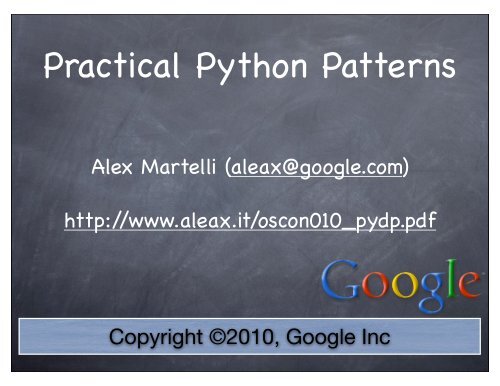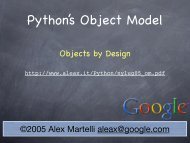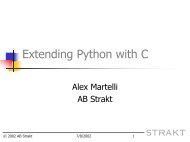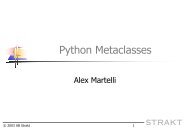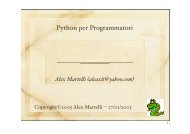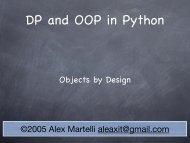Practical Python Patterns - Alex Martelli
Practical Python Patterns - Alex Martelli
Practical Python Patterns - Alex Martelli
Create successful ePaper yourself
Turn your PDF publications into a flip-book with our unique Google optimized e-Paper software.
<strong>Practical</strong> <strong>Python</strong> <strong>Patterns</strong><br />
<strong>Alex</strong> <strong>Martelli</strong> (aleax@google.com)<br />
http://www.aleax.it/oscon010_pydp.pdf<br />
Copyright ©2010, Google Inc
The "levels" of this talk<br />
Shu<br />
("Retain")<br />
DP<br />
Ha<br />
("Detach")<br />
Py<br />
Ri<br />
("Transcend")<br />
2
A Pattern Example<br />
"Forces": a rich,<br />
complex system offers a<br />
lot of functionality;<br />
client code interacts<br />
with many parts of this<br />
functionality in a way<br />
that's "out of control"<br />
this causes many<br />
problems for client-code<br />
programmers AND the<br />
system's ones too<br />
(complexity + rigidity)<br />
3
Solution: the "Facade" DP<br />
interpose a simpler<br />
"Facade" object/class<br />
exposing a controlled<br />
subset of functionality<br />
client code now calls<br />
into the Facade, only<br />
the Facade implements<br />
DP "Facade"<br />
! existing supplier code ! provides rich,<br />
complex functionality in protocol S<br />
! we need a simpler "subset" C of S<br />
its simpler functionality<br />
(by calling S on !)<br />
via calls into the rich,<br />
complex subsystem<br />
subsystem implementers<br />
gains flexibility, clients gain simplicity<br />
! facade code " implements and suppli<br />
© 2004 AB Strakt 17<br />
ST<br />
4
Facade is a Design Pattern<br />
summary of a frequent design problem +<br />
structure of a solution to that problem (+<br />
pros and cons, alternatives, ...), and:<br />
A NAME (much easier to retain/discuss!)<br />
"descriptions of communicating objects and<br />
classes customized to solve a general design<br />
problem in a particular context"<br />
that's NOT: a data structure, an algorithm,<br />
a domain-specific system architecture, a<br />
programming-language/library feature<br />
MUST be studied in a specific context!<br />
BEST: give Known Uses ("KU"), "stars"<br />
5
Some Facade KUs<br />
...in the <strong>Python</strong> standard library...:<br />
dbhash facades for bsddb<br />
highly simplified/subset access<br />
also meets the "dbm" interface (thus,<br />
also an example of the Adapter DP)<br />
os.path: basename, dirname facade for<br />
split + indexing; isdir (&c) facade for<br />
os.stat + stat.S_ISDIR (&c)<br />
Facade is a structural DP (we'll see another,<br />
Adapter, later; in dbhash, they "merge"!-)<br />
6
Is Facade a "<strong>Python</strong>ic" DP?<br />
yes... and no<br />
it works just fine in <strong>Python</strong>, but...<br />
...it works just as well most everywhere!<br />
i.e., it is, rather, a "universal" DP<br />
points to ponder/debate...:<br />
is it "Facade" if it offers all functionality?<br />
is it "Facade" if it _adds_ functionality?<br />
do taxonomies ever work fully?-)<br />
do other DPs/idioms "go well with it"?<br />
"above"? "below"? "to the side"?<br />
7
Design <strong>Patterns</strong><br />
8
What's a Design Pattern<br />
summary of a frequent design problem +<br />
structure of a solution to that problem +<br />
pros and cons, alternatives, ..., and:<br />
A NAME (much easier to retain/discuss!)<br />
"descriptions of communicating objects and<br />
classes customized to solve a general design<br />
problem in a particular context"<br />
DPs are NOT: data structures, algorithms,<br />
domain-specific system architectures,<br />
programming language features<br />
MUST be studied in a language's context!<br />
Best: supply Known Uses ("KU") & "stars"<br />
9
Step back: what's a Pattern?<br />
identify a closely related class of problems<br />
if there is no problem, why solve it?-)<br />
identify a class of solutions to the problems<br />
closely related, just like the problems are<br />
may exist in any one of many different<br />
possible scales ("phases of work")<br />
just like the problems do<br />
Design patterns are exactly those patterns<br />
whose scale/phase is... design!<br />
10
A Pattern's "problem(s)"<br />
each Pattern addresses a problem<br />
rather, a closely related class of problems<br />
a problem is defined by:<br />
"forces"<br />
constraints, desiderata, side effects, ...<br />
"context" (including: what technologies<br />
can be deployed to solve the problem)<br />
11
A Pattern's "solution(s)"<br />
to write-up a pattern, you must identify a<br />
class of solutions to the problems<br />
within the context (technologies, &c)<br />
meaningful name and summary<br />
a "middling-abstraction" description<br />
real-world examples (if any!-), "stars"<br />
one-star == "0/1 existing examples"<br />
rationale, "quality without a name"<br />
how it balances forces / +'s & issues<br />
pointers to related/alternative patterns<br />
12
Why bother w/<strong>Patterns</strong>?<br />
identifying patterns helps all practitioners<br />
of a field "up their game"...<br />
...towards the practices of the very best<br />
ones in the field<br />
precious in teaching, training, self-study<br />
precious in concise communication, esp. in<br />
multi-disciplinary cooperating groups<br />
also useful in enhancing productivity<br />
to recognize is faster than to invent<br />
structured description helps recognition<br />
13
"Design" is a vague term...<br />
most generically, it can mean "purpose"<br />
or specifically, a plan towards a purpose<br />
a geometrical or graphical arrangement<br />
an "arrangement" in a more abstract sense<br />
...<br />
in saying "Design <strong>Patterns</strong>", we mean<br />
"design" in the sense common to buildings<br />
architecture and SW development:<br />
work phase "between" study/analysis and<br />
"actual building" (not temporally;-)<br />
(SWers use "architecture" differently;-)<br />
14
Other kinds of <strong>Patterns</strong><br />
Analysis: find/identify value-opportunities<br />
Architecture: large-scale overall-system<br />
approaches to let subsystems cooperate<br />
Human Experience: focus on how a system<br />
presents itself and interacts with people<br />
Testing: how best to verify system quality<br />
Cooperation: how to help people work<br />
together productively to deliver value<br />
Delivery/Deployment: how to put the<br />
system in place (& adjust it iteratively)<br />
...<br />
15
What's a "<strong>Python</strong>ic" Pattern?<br />
a Design Pattern arising in contexts where<br />
(part of) the technology in use is <strong>Python</strong><br />
well-adapted to <strong>Python</strong>'s strengths, if and<br />
when those strengths are useful<br />
dealing with <strong>Python</strong>-specific issues, if any<br />
basically, all the rest of this tutorial!<br />
16
Many Good DP Books<br />
(biblio on the last slide)<br />
17
Classic (Gof4) DP Categories<br />
Creational: ways and means of object<br />
instantiation<br />
Structural: mutual composition of classes or<br />
objects (the Facade DP is Structural)<br />
Behavioral: how classes or objects interact<br />
and distribute responsibilities among them<br />
Each can be class-level or object-level<br />
18
Prolegomena to DPs<br />
"program to an interface, not to an<br />
implementation"<br />
that's mostly done with "duck typing" in<br />
<strong>Python</strong> -- rarely w/"formal" interfaces<br />
in 2.6+, ABCs can change that a bit!<br />
pretty similar to "signature-based<br />
polymorphism" in C++ templates<br />
19
Duck Typing Helps!<br />
Teaching the ducks to type takes a while,<br />
but saves you a lot of work afterwards!-)<br />
20
Prolegomena to DPs<br />
"favor object composition over class<br />
inheritance"<br />
in <strong>Python</strong>: hold, or wrap<br />
inherit only when it's really convenient<br />
expose all methods in base class (reuse<br />
+ usually override + maybe extend)<br />
but, it's a very strong coupling!<br />
2.6+ ABCs can help with this, too<br />
21
<strong>Python</strong>: hold or wrap?<br />
22
<strong>Python</strong>: hold or wrap?<br />
“Hold”: object O has subobject S as an<br />
attribute (maybe property) -- that’s all<br />
use self.S.method or O.S.method<br />
simple, direct, immediate, but... pretty<br />
strong coupling, often on the wrong axis<br />
holder<br />
holdee<br />
client<br />
23
<strong>Python</strong>: hold or wrap?<br />
“Wrap”: hold (often via private name) plus<br />
delegation (so you directly use O.method)<br />
explicit (def method(self...)...self.S.method)<br />
automatic (delegation in __getattr__)<br />
gets coupling right (Law of Demeter)<br />
wrapper<br />
wrappee<br />
client<br />
24
E.g: wrap to "restrict"<br />
class RestrictingWrapper(object):<br />
def __init__(self, w, block):<br />
self._w = w<br />
self._block = block<br />
def __getattr__(self, n):<br />
if n in self._block:<br />
raise AttributeError, n<br />
return getattr(self._w, n)<br />
...<br />
Inheritance cannot restrict!<br />
25
Creational <strong>Patterns</strong><br />
26
Creational DPs: "Just One"<br />
"we want just one instance to exist"<br />
use a module instead of a class<br />
no subclassing, no special methods, ...<br />
make just 1 instance (no enforcement)<br />
need to commit to "when" to make it<br />
singleton ("highlander")<br />
subclassing can never be really smooth<br />
monostate ("borg")<br />
Guido dislikes it<br />
27
Singleton ("Highlander")<br />
class Singleton(object):<br />
def __new__(cls, *a, **k):<br />
if not hasattr(cls, '_inst'):<br />
cls._inst = super(Singleton, cls<br />
).__new__(cls, *a, **k)<br />
return cls._inst<br />
subclassing is always a problem, though:<br />
class Foo(Singleton): pass<br />
class Bar(Foo): pass<br />
f = Foo(); b = Bar(); # ...???...<br />
problem is intrinsic to Singleton<br />
28
Monostate ("Borg")<br />
class Borg(object):<br />
_shared_state = {}<br />
def __new__(cls, *a, **k):<br />
obj = super(Borg, cls<br />
).__new__(cls, *a, **k)<br />
obj.__dict__ = cls._shared_state<br />
return obj<br />
subclassing is no problem, just do...:<br />
class Foo(Borg): pass<br />
class Bar(Foo): pass<br />
class Baz(Foo): _shared_state = {}<br />
data overriding to the rescue!<br />
29
Creational DPs: "Flexibility"<br />
"we don't want to commit to instantiating a<br />
specific concrete class"<br />
"Dependency Injection" DP<br />
no creation except "outside"<br />
what if multiple creations are needed?<br />
"Factory" subcategory of DPs<br />
may create w/ever or reuse existing<br />
factory functions (& other callables)<br />
factory methods (overridable)<br />
factory classes (abstract & not)<br />
30
DI: why we want it<br />
class Scheduler(object):<br />
def __init__(self):<br />
self.i = itertools.count().next<br />
self.q = somemodule.PriorityQueue()<br />
def AddEvent(self, when, c, *a, **k):<br />
self.q.push((when, self.i(), c, a, k))<br />
def Run(self):<br />
while self.q:<br />
when, n, c, a, k = self.q.pop()<br />
time.sleep(when - time.time())<br />
c(*a, **k)<br />
31
Side note...:<br />
class PriorityQueue(object):<br />
def __init__(self):<br />
self.l = []<br />
def __len__(self):<br />
return len(self.l)<br />
def push(self, obj):<br />
heapq.heappush(self.l, obj)<br />
def pop(self):<br />
return heapq.heappop(self.l)<br />
32
Fine, but...<br />
...how to test Scheduler without long waits?<br />
...how to integrate it with other subsystems'<br />
event loops, simulations, ...?<br />
Core issue: Scheduler "concretely depends"<br />
on concrete objects (time.sleep, time.time).<br />
Possible solutions:<br />
1. Template Method (Structural, see later)<br />
2. "Monkey Patching" (idiom)<br />
3. Dependency Injection<br />
33
Template Method vs DI<br />
See later, but, a summary:<br />
...<br />
when, n, c, a, k = self.q.pop()<br />
self.WaitFor(when)<br />
c(*a, **k)<br />
...<br />
def WaitFor(self, when):<br />
time.sleep(when - time.time())<br />
To customize: subclass, override WaitFor<br />
34
TM-vs-DI example<br />
class sq(ss):<br />
def __init__(self):<br />
ss.__init__(self)<br />
ss.mtq = Queue.Queue()<br />
def WaitFor(self, when):<br />
try:<br />
while when>time.time():<br />
c, a, k = self.mtq.get(true,<br />
time.time() - when)<br />
c(*a, **k)<br />
except Queue.Empty:<br />
return<br />
35
TM-vs-DI issues<br />
inheritance → strong, inflexible coupling<br />
per-class complex, specialized extra logic<br />
not ideal for testing<br />
if another subsystem makes a scheduler,<br />
how does it know to make a testscheduler<br />
instance vs a simple one?<br />
multiple integrations even harder than need<br />
be (but, there's no magic bullet for those!-)<br />
36
Monkey-patching...<br />
import ss<br />
class faker(object): pass<br />
fake = faker()<br />
ss.time = fake<br />
fake.sleep = ...<br />
fake.time = ...<br />
handy in emergencies, but...<br />
...easily abused for NON-emergencies!<br />
"gives dynamic languages a bad name"!-)<br />
subtle, hidden "communication" via secret,<br />
obscure pathways (explicit is better!-)<br />
37
Dependency Injection<br />
class Scheduler(object):<br />
def __init__(self, tm=time.time,<br />
sl=time.sleep):<br />
self.tm = tm<br />
self.sl = sl<br />
...<br />
self.sl(when - self.tm())<br />
a known use: standard library sched module!<br />
38
With DI, "faking" is easy<br />
class faketime(object):<br />
def __init__(self, t=0.0): self.t = t<br />
def time(self): return self.t<br />
def sleep(self, t): self.t += t<br />
f = faketime()<br />
s = Scheduler(f.time, f.sleep)<br />
...<br />
39
DI/TM "coopetition"<br />
Not mutually exclusive...:<br />
class Scheduler(object):<br />
def __init__(self, tm=time.time,<br />
sl=time.sleep):<br />
... # move key operation to a method:<br />
def WaitFor(self, when):<br />
self.sl(when-self.tm())<br />
then may use either injection, or subclassing and<br />
overriding, (or both!-), for testing, integration, &c<br />
40
DI design-choice details<br />
inject by constructor (as shown before)<br />
with, or without, default dep. values?<br />
ensure just-made instance is consistent<br />
choose how "visible" to make the inject...<br />
inject by setter<br />
automatic in <strong>Python</strong> (use non-_ names)<br />
very flexible (sometimes too much;-)<br />
"inject by interface" (AKA "IoC type 1")<br />
not very relevant to <strong>Python</strong><br />
DI: by code or by config-file/flags?<br />
41
DI and factories<br />
class ts(object):<br />
...<br />
def Delegate(self, c, a, k):<br />
q = Queue.Queue()<br />
def f(): q.put(c(*a,**k))<br />
t = threading.Thread(target=f)<br />
t.start()<br />
return q<br />
each call to Delegate needs a new Queue and a<br />
new Thread; how do we DI these objects...?<br />
easy solution: inject factories for them!<br />
42
DI and factories<br />
class ts(object):<br />
def __init__(self, q=Queue.Queue,<br />
t=threading.Thread):<br />
self.q = q<br />
self.t = t<br />
...<br />
def Delegate(self, c, a, k):<br />
q = self.q()<br />
...<br />
t = self.t(target=f)<br />
pretty obvious/trivial solution when each class is<br />
a factory for its instances, of course;-)<br />
43
The Callback Pattern<br />
AKA "the Hollywood Principle"...:<br />
"Don't call us, we'll call you!"<br />
44
The "Callback" concept<br />
it's all about library/framework code that<br />
"calls back" into YOUR code<br />
rather than the "traditional" (procedural)<br />
approach where YOU call code supplied as<br />
entry points by libraries &c<br />
AKA, the "Hollywood principle":<br />
"don't call us, we'll call you"<br />
by: Richard E. Sweet, in "The Mesa Programming<br />
Environment", SigPLAN Notices, July 1985<br />
for: customization (flexibility) and "event-driven"<br />
architectures ("actual" events OR "structuring of<br />
control-flow" ["pseudo" events])<br />
45
"Callback" implementation<br />
hand a callable over to "somebody"<br />
the "somebody" may store it "somewhere"<br />
a container, an attribute, whatever<br />
or even just keep it as a local variable<br />
and calls it "when appropriate"<br />
when it needs some specific functionality<br />
(i.e., for customization)<br />
or, when appropriate events "occur" (state<br />
changes, user actions, network or other<br />
I/O, timeouts, system events, ...) or "are<br />
made up" (structuring of control-flow)<br />
46
Lazy-loading Callbacks<br />
class LazyCallable(object):<br />
def __init__(self, name):<br />
self.n, self.f = name, None<br />
def __call__(self, *a, **k):<br />
if self.f is None:<br />
modn, funcn = self.n.rsplit('.', 1)<br />
if modn not in sys.modules:<br />
__import__(modn)<br />
self.f = getattr(sys.modules[modn],<br />
funcn)<br />
self.f(*a, **k)<br />
47
Customization<br />
48
Customizing sort (by key)<br />
mylist.sort(key=str.toupper)<br />
handily, speedily embodies the DSU pattern:<br />
def DSU_sort(mylist, key):<br />
aux = [ (key(v), j, v)<br />
for j, v in enumerate(mylist)]<br />
aux.sort()<br />
mylist[:] = [v for k, j, v in aux]<br />
Note that a little "workaround" is needed wrt the<br />
usual "call a method on each object" OO idiom...<br />
49
Events<br />
50
Kinds of "Event" callbacks<br />
Events "proper"...:<br />
GUI frameworks (mouse, keyboard, ...)<br />
Observer/Observable design pattern<br />
asynchronous (event-driven) I/O (net &c)<br />
"system-event" callbacks<br />
Pseudo-events for "structuring" execution:<br />
"event-driven" parsing (SAX &c)<br />
"scheduled" callbacks (sched)<br />
"concurrent" callbacks (threads &c)<br />
timing and debugging (timeit, pdb, ...)<br />
51
Events in GUI frameworks<br />
the most classic of event-driven fields<br />
e.g, consider Tkinter:<br />
elementary callbacks e.g. for buttons:<br />
b=Button(parent, text='boo!', command=...)<br />
flexible, advanced callbacks and events:<br />
wgt.bind(event, handler)<br />
event: string describing the event (e.g.<br />
'', '', '', ...)<br />
handler: callable taking Event argument<br />
(w. attributes .widget, .x, .y, .type, ...)<br />
can also bind by class, all, root window...<br />
52
The Observer DP<br />
a "target object" lets you add "observers"<br />
could be simple callables, or objects<br />
object == "collection of callable"<br />
when the target's state changes, it calls<br />
back to "let the observers know"<br />
design choices: "general" observers<br />
(callbacks on ANY state change), "specific"<br />
observers (callbacks on SPECIFIC state<br />
changes; level of specificity may vary),<br />
"grouped" observers (objects with >1<br />
methods for kinds of state-change), ...<br />
53
Callback issues<br />
what arguments are to be used on the call?<br />
no arguments: simplest, a bit "rough"<br />
in Observer: pass as argument the target<br />
object whose state just changed<br />
lets 1 callable observe several targets<br />
or: a "description" of the state changes<br />
saves "round-trips" to obtain them<br />
other: identifier or description of event<br />
but -- what about other arguments (related<br />
to the callable, not to the target/event)...?<br />
54
Fixed args in callbacks<br />
functools.partial(callable, *a, **kw)<br />
pre-bind any or all arguments<br />
however, note the difference...:<br />
x.setCbk(functools.partial(f, *a, **kw))<br />
vs<br />
x.setCbk(f, *a, **kw)<br />
...having the set-callback itself accept (and<br />
pre-bind) arguments is a neater idiom<br />
sombunall 1 <strong>Python</strong> callback systems use it<br />
1<br />
: Robert Anton Wilson<br />
55
Callback "dispatching"<br />
what if more than one callback is set for a<br />
single event (or, Observable target)?<br />
remember and call the latest one only<br />
simplest, roughest<br />
or, remember and call them all<br />
LIFO? FIFO? or...?<br />
how do you _remove_ a callback?<br />
can one callback "preempt" others?<br />
can events (or state changes) be "grouped"?<br />
use object w/methods instead of callable<br />
56
Callbacks and Errors<br />
are "errors" events like any others?<br />
or are they best singled-out?<br />
http://www.python.org/pycon/papers/deferex/<br />
Twisted Matrix's "Deferred" pattern: one<br />
Deferred object holds...<br />
N "chained" callbacks for "successes" +<br />
M "chained" callbacks for "errors"<br />
each callback is held WITH opt *a, **kw<br />
plus, argument for "event / error<br />
identification" (or, result of previous<br />
callback along the appropriate "chain")<br />
57
System-events callbacks<br />
for various <strong>Python</strong> "system-events":<br />
atexit.register(callable, *a, **k)<br />
oldhandler = signal.signal(signum, callable)<br />
sys.displayhook, sys.excepthook,<br />
sys.settrace(callable),<br />
sys.setprofile(callable)<br />
some extension modules do that, too...:<br />
readline.set_startup_hook,<br />
set_pre_input_hook, set_completer<br />
58
"Pseudo" events<br />
"events" can be a nice way to structure<br />
execution (control) flow<br />
so in some cases "we make them up" (!)<br />
just to allow even-driven callbacks in<br />
otherwise non-obvious situations;-)<br />
parsing, scheduling, concurrency, timing,<br />
debugging, ...<br />
59
Event-driven parsing<br />
e.g. SAX for XML<br />
"events" are start and end of tags<br />
handlers are responsible for keeping stack<br />
or other structure as needed<br />
often not necessary to keep all...!<br />
at the other extreme: XML's DOM<br />
somewhere in-between: "pull DOM"...<br />
events as "stream" rather than callback<br />
can "expand node" for DOMy subtrees<br />
60
Scheduled callbacks<br />
standard library module sched<br />
s = sched.Sched(timefunc, delayfunc)<br />
e.g, Sched(time.time, time.sleep)<br />
evt = s.enter(delay, priority, callable, arg)<br />
or s.enterabs(time, priority, callable, arg)<br />
may s.cancel(evt) later<br />
s.run() runs events until queue is empty (or<br />
an exception is raised in callable or<br />
delayfunc: it propagates but leaves s in<br />
stable state, s.run can be called again later)<br />
61
"Concurrent" callbacks<br />
threading.Thread(target=..,args=..,kwargs=..)<br />
call backs to target(*args,**kwargs)<br />
at the t.start() event [or later...!]<br />
*in a separate thread* (the key point!-)<br />
multiprocessing.Process<br />
stackless: stacklet.tasklet(callable)<br />
calls back according to setup<br />
when tasklet active and front-of-queue<br />
channels, reactivation, rescheduling<br />
62
Timing and debugging<br />
timeit.Timer(stmt, setup)<br />
*string* arguments to compile & execute<br />
a dynamic-language twist on callback!-)<br />
"event" for callback:<br />
setup: once, before anything else<br />
stmt: many times, for timing<br />
the pdb debugger module lets you use<br />
either strings or callables...:<br />
pdb.run and .runeval: strings<br />
pdb.runcall: callable, arguments<br />
63
Structural <strong>Patterns</strong><br />
"Masquerading/Adaptation" subcategory:<br />
Adapter: tweak an interface (both class and<br />
object variants exist)<br />
Facade: simplify a subsystem's interface<br />
...and many others I don't cover, such as:<br />
Bridge: many implementations of an<br />
abstraction, many implementations of a<br />
functionality, no repetitive coding<br />
Decorator: reuse+tweak w/o inheritance<br />
Proxy: decouple from access/location<br />
64
Adapter<br />
client code γ requires a protocol C<br />
supplier code σ provides different protocol<br />
S (with a superset of C's functionality)<br />
adapter code α "sneaks in the middle":<br />
to γ, α is a supplier (produces protocol C)<br />
to σ, α is a client (consumes protocol S)<br />
"inside", α implements C (by means of<br />
appropriate calls to S on σ)<br />
in protocol C<br />
65
Toy-example Adapter<br />
C requires method foobar(foo, bar)<br />
S supplies method barfoo(bar, foo)<br />
e.g., σ could be:<br />
class Barfooer(object):<br />
def barfoo(self, bar, foo):<br />
...<br />
66
Object Adapter<br />
per-instance, with wrapping delegation:<br />
class FoobarWrapper(object):<br />
def __init__(self, wrappee):<br />
self.w = wrappee<br />
def foobar(self, foo, bar):<br />
return self.w.barfoo(bar, foo)<br />
foobarer=FoobarWrapper(barfooer)<br />
67
Class Adapter<br />
per-class, w/subclasing & self-delegation:<br />
class Foobarer(Barfooer):<br />
def foobar(self, foo, bar):<br />
return self.barfoo(bar, foo)<br />
foobarer=Foobarer(...w/ever...)<br />
68
Class Adapter (mixin)<br />
flexible, good use of multiple inheritance:<br />
class BF2FB:<br />
def foobar(self, foo, bar):<br />
return self.barfoo(bar, foo)<br />
class Foobarer(BF2FB, Barfooer):<br />
pass<br />
foobarer=Foobarer(...w/ever...)<br />
69
Adapter KU<br />
socket._fileobject: from sockets to file-like<br />
objects (w/much code for buffering)<br />
doctest.DocTestSuite: adapts doctest tests<br />
to unittest.TestSuite<br />
dbhash: adapt bsddb to dbm<br />
StringIO: adapt str or unicode to file-like<br />
shelve: adapt "limited dict" (str keys and<br />
values, basic methods) to complete mapping<br />
via pickle for any string<br />
+ UserDict.DictMixin<br />
70
Adapter observations<br />
some RL adapters may require much code<br />
mixin classes are a great way to help adapt<br />
to rich protocols (implement advanced<br />
methods on top of fundamental ones)<br />
Adapter occurs at all levels of complexity<br />
in <strong>Python</strong>, it's _not_ just about classes and<br />
their instances (by a long shot!-) -- often<br />
_callables_ are adapted (via decorators and<br />
other HOFs, closures, functools, ...)<br />
71
Facade vs Adapter<br />
Adapter's about supplying a given protocol<br />
required by client-code<br />
or, gain polymorphism via homogeneity<br />
Facade is about simplifying a rich interface<br />
when just a subset is often needed<br />
Facade most often "fronts" for a subsystem<br />
made up of many classes/objects, Adapter<br />
"front" for just one single object or class<br />
72
Behavioral <strong>Patterns</strong><br />
Template Method: self-delegation<br />
..."the essence of OOP"...<br />
some of its many <strong>Python</strong>-specific variants<br />
73
Template Method<br />
great pattern, lousy name<br />
"template" very overloaded<br />
generic programming in C++<br />
generation of document from skeleton<br />
...<br />
a better name: self-delegation<br />
directly descriptive!-)<br />
74
Classic TM<br />
abstract base class offers "organizing<br />
method" which calls "hook methods"<br />
in ABC, hook methods stay abstract<br />
concrete subclasses implement the hooks<br />
client code calls organizing method<br />
on some reference to ABC (injecter, or...)<br />
which of course refers to a concrete SC<br />
75
TM skeleton<br />
class AbstractBase(object):<br />
def orgMethod(self):<br />
self.doThis()<br />
self.doThat()<br />
class Concrete(AbstractBase):<br />
def doThis(self): ...<br />
def doThat(self): ...<br />
76
KU: cmd.Cmd.cmdloop<br />
def cmdloop(self):<br />
self.preloop()<br />
while True:<br />
s = self.doinput()<br />
s = self.precmd(s)<br />
finis = self.docmd(s)<br />
finis = self.postcmd(finis,s)<br />
if finis: break<br />
self.postloop()<br />
77
Classic TM Rationale<br />
the "organizing method" provides<br />
"structural logic" (sequencing &c)<br />
the "hook methods" perform "actual<br />
``elementary'' actions"<br />
it's an often-appropriate factorization of<br />
commonality and variation<br />
focuses on objects' (classes')<br />
responsibilities and collaborations: base<br />
class calls hooks, subclass supplies them<br />
applies the "Hollywood Principle": "don't<br />
call us, we'll call you"<br />
78
A choice for hooks<br />
class TheBase(object):<br />
def doThis(self):<br />
# provide a default (often a no-op)<br />
pass<br />
def doThat(self):<br />
# or, force subclass to implement<br />
# (might also just be missing...)<br />
raise NotImplementedError<br />
Default implementations often handier, when<br />
sensible; but "mandatory" may be good docs.<br />
79
KU: Queue.Queue<br />
class Queue:<br />
...<br />
def put(self, item):<br />
self.not_full.acquire()<br />
try:<br />
while self._full():<br />
self.not_full.wait()<br />
self._put(item)<br />
self.not_empty.notify()<br />
finally:<br />
self.not_full.release()<br />
def _put(self, item): ...<br />
80
Queue’s TMDP<br />
Not abstract, often used as-is<br />
thus, implements all hook-methods<br />
subclass can customize queueing discipline<br />
with no worry about locking, timing, ...<br />
default discipline is simple, useful FIFO<br />
can override hook methods (_init, _qsize,<br />
_empty, _full, _put, _get) AND...<br />
...data (maxsize, queue), a <strong>Python</strong> special<br />
81
Customizing Queue<br />
class LifoQueueA(Queue):<br />
def _put(self, item):<br />
self.queue.appendleft(item)<br />
class LifoQueueB(Queue):<br />
def _init(self, maxsize):<br />
self.maxsize = maxsize<br />
self.queue = list()<br />
def _get(self):<br />
return self.queue.pop()<br />
82
A Priority/FIFO Queue<br />
class PriorityQueue(Queue):<br />
def _init(self, maxsize):<br />
self.maxsize = maxsize<br />
self.q = list()<br />
self._n = 0<br />
def put(self, priority, item):<br />
Queue.put(self, (priority, item))<br />
def _put(self, (p,i)):<br />
self._n += 1<br />
heapq.heappush(self.q, (p,self._n,i))<br />
def _get(self):<br />
return heapq.heappop(self.q)[-1]<br />
83
"Factoring out" the hooks<br />
"organizing method" in one class<br />
"hook methods" in another<br />
KU: HTML formatter vs writer<br />
KU: SAX parser vs handler<br />
adds one axis of variability/flexibility<br />
shades towards the Strategy DP:<br />
Strategy: 1 abstract class per decision<br />
point, independent concrete classes<br />
Factored TM: abstract/concrete classes<br />
more "grouped"<br />
84
TM + introspection<br />
"organizing" class can snoop into "hook"<br />
class (maybe descendant) at runtime<br />
find out what hook methods exist<br />
dispatch appropriately (including "catchall"<br />
and/or other error-handling)<br />
very handy for event-driven programming<br />
when you can't (or do not want to…!)<br />
"predict" all possible events in the ABC<br />
(e.g., event-driven parsing of HTML or XML)<br />
85
KU: cmd.Cmd.docmd<br />
def docmd(self, cmd, a):<br />
...<br />
try:<br />
fn = getattr(self, 'do_' + cmd)<br />
except AttributeError:<br />
return self.dodefault(cmd, a)<br />
return fn(a)<br />
86
A multi-style TM case<br />
classic + factored + introspective<br />
multiple "axes" to separate three<br />
carefully distinguished "variabilities"<br />
DP equivalent of a "3-Subjects Fugue"<br />
"all arts aspires to the condition of<br />
Music" (Pater, Pound, Santayana...?-)<br />
87
UC: unittest.TestCase<br />
def__call__(self, result):<br />
method = getattr(self, ...)<br />
try: self.setUp()<br />
except: result.addError(...)<br />
try: method()<br />
except self.failException, e:...<br />
try: self.tearDown()<br />
except: result.addError(...)<br />
...result.addSuccess(...)...<br />
88
KU: ABCs<br />
Simple example, collections.Sequence:<br />
class Sequence(Sized,Iterable,Container):<br />
def count(self, value):<br />
the_count = 0<br />
for item in self:<br />
if item == value:<br />
the_count += 1<br />
return the_count<br />
...<br />
See also module abc.<br />
89
Questions & Answers<br />
http://www.aleax.it/oscon010_pydp.pdf<br />
Q?<br />
A!<br />
90
1.Design <strong>Patterns</strong>: Elements of Reusable Object-Oriented Software --<br />
Gamma, Helms, Johnson, Vlissides -- advanced, very deep, THE classic<br />
"Gang of 4" book that started it all (C++)<br />
2.Head First Design <strong>Patterns</strong> -- Freeman -- introductory, fast-paced,<br />
very hands-on (Java)<br />
3.Design <strong>Patterns</strong> Explained -- Shalloway, Trott -- introductory, mix<br />
of examples, reasoning and explanation (Java)<br />
4.The Design <strong>Patterns</strong> Smalltalk Companion -- Alpert, Brown, Woolf<br />
-- intermediate, very language-specific (Smalltalk)<br />
5.Agile Software Development, Principles, <strong>Patterns</strong> and Practices --<br />
Martin -- intermediate, extremely practical, great mix of theory and<br />
practice (Java, C++)<br />
6.Refactoring to <strong>Patterns</strong> -- Kerievsky -- introductory, strong<br />
emphasis on refactoring existing code (Java)<br />
7.Pattern Hatching, Design <strong>Patterns</strong> Applied -- Vlissides -- advanced,<br />
anecdotal, specific applications of ideas from the Gof4 book (C++)<br />
8.Modern C++ Design: Generic Programming and Design <strong>Patterns</strong><br />
Applied -- <strong>Alex</strong>andrescu -- advanced, very language specific (C++)<br />
91


